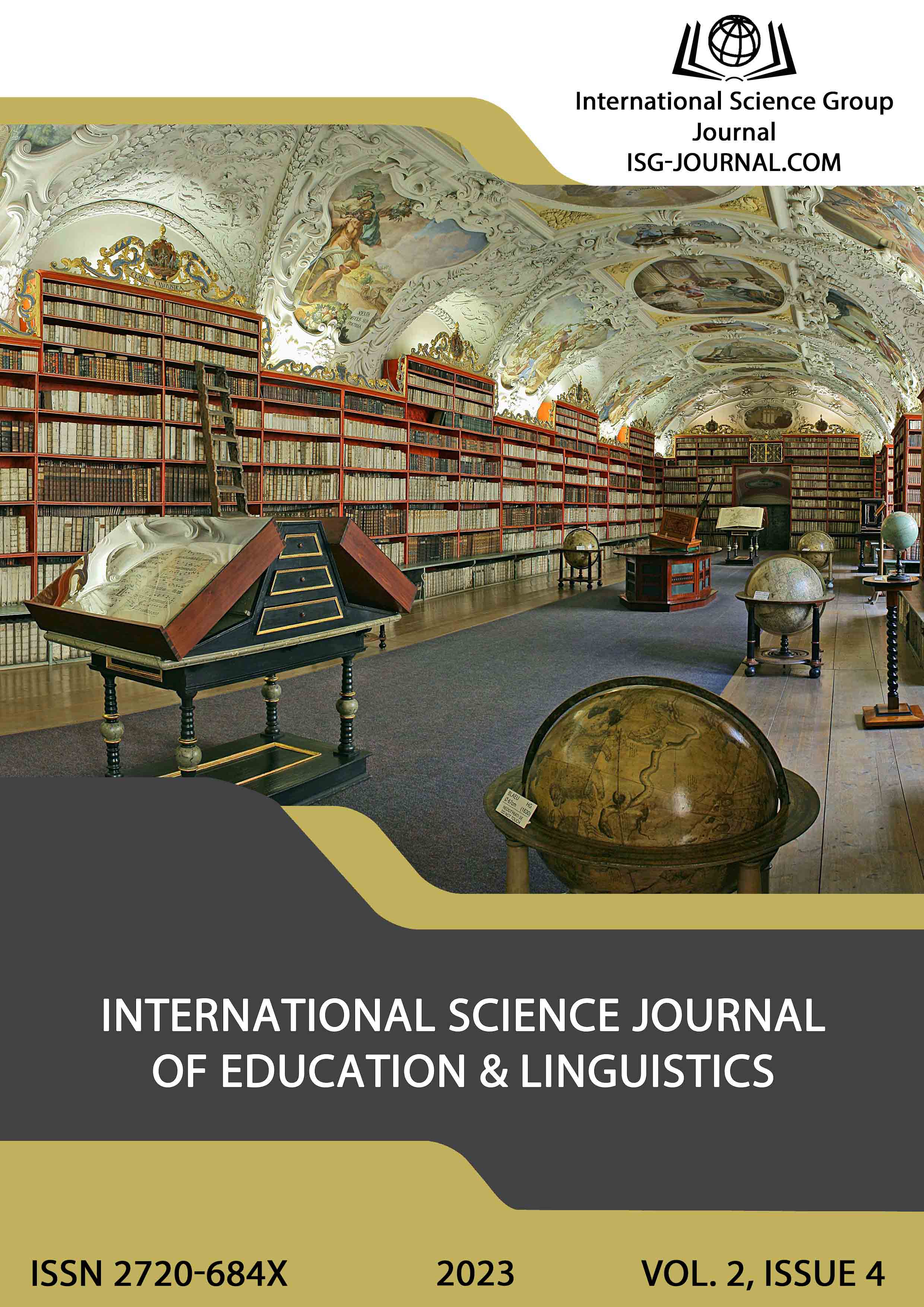Formation of soft- and meta-skills among the students majoring in International Relations when learning English in the institutions of higher education in conditions of distance education
DOI:
https://doi.org/10.46299/j.isjel.20230204.02Keywords:
soft-skills, meta-skills, international relations, foreign (English) language, institutions of higher educationAbstract
The article is devoted to the analysis of the acquisition of communicative interpersonal skills when studying foreign languages by the students majoring in «International Relations», which will contribute to effective professional advancement. A detailed analysis of the concepts of «soft skills» and «meta-skills» was carried out, as well as a comparison of the characteristics of soft skills and the ability to create appropriate opportunities for training students in the field of «International Relations». Attention is focused on the combination of theory with practical activity, which is a powerful tool for the formation of basic life-necessary competences and effective promotion on the international arena. The major «International Relations» organically combines various aspects of specialist training. It is for this purpose that practitioners in the field of international relations are involved into the educational process, namely extraordinary and plenipotentiary ambassadors of Ukraine in various countries of the world, consuls, representatives of ministries, professional translators, political scientists, lawyers, etc., who form soft skills using real examples. The priority in the article is given to foreign languages, since they play a significant role in successful advancement in this field. After all, it is no secret that multilingual education of a specialist contributes to more effective communication, understanding of cross-cultural communications and intercultural relations, it is a priority in matters of cooperation, negotiations and during the resolution of possible international conflicts, etc. The development and mastery of soft- and meta-skills help to establish effective foreign language communication with the participants of the communicative process and are considered important professional skills. The task of the institutions of higher education is to find ways of forming soft- and meta-skills among the students majoring in «International Relations» while studying foreign languages in conditions of force majeure, which became the cause of the forced transition to distance learning, as well as to teach future specialists to achieve the highest results in their further career through skilful application of such skills.
References
Бояціс Р., Гоулман Д., Маккі Е. (2019) Емоційний інтелект лідера. Вид-во: Наш формат, 288 с.
Гарбузюк, І.В. (2019) Conceptual and categorical analysis of adolescent education based on the development of life skills In: Сучасний виховний процес: сутність та інноваційний потенціал: матеріали звіт. наук-.практ. конф. Ін-ту проблем виховання НАПН України НАІР, м. Івано- Франківськ, Україна, cc. 49-54.
Гуща Г. (2020) Місце і роль іноземної мови в формуванні soft skills. «Soft skills» – невід’ємні аспекти формування конкурентоспроможності студентів у XXI ст. Київ : Київ. нац. торг.-екон. ун-т, сс. 28–31. URL: https://knute.edu.ua/file/NjY4NQ
Ґоулман Деніел (2018) Емоційний інтелект. Книжка, яка змінює уявлення про те, що означає бути розумним. Видавництво: «Vivat», 512 с.
Закон України «Про освіту» (2017) URL: https://zakon.rada.gov.ua/ laws/show/2145-19.
Закон України «Про повну загальну середню освіту», 2020. Взято з https://zakon.rada.gov.ua/laws/show/463-20#Text
Катаев С. Л. (2019) Зарубежный опыт социального образования в аспекте компетентностного подхода. «SOCIOПРОСТІР: міждисциплінарний електронний збірник наукових праць з соціології та соціальної роботи», № 8.
Коваль К. (2015) Розвиток «soft skills» у студентів – один із чинників для їх працевлаштування. Вісник Вінницького політехнічного інституту. № 2. С. 162–167. URL: https://visnyk.vntu.edu.ua/index.php/visnyk/article/ view/827/826
Шестель, О. Г., Старинець, О.А., Литвин, Т.П., & Куракін, О.Б. (2020) Специфіка формування «soft skills» фахівців сфери обслуговування у процесі вивчення іноземних мов. Актуальні питання гуманітарних наук : міжвузівський збірник наукових праць молодих вчених Дрогобицького державного педагогічного університету імені Івана Франка. № 32. С. 244–248. Взято з http://www.aphn-journal.in.ua/archive/32_2020/part_2/44.pdf
Business Soft Skills durch Fremdsprachen. URL: https://www.brainread.com/business-soft-skills-durch-fremdsprachen/
Calvello Mara. Hard Skills vs. Soft Skills: Why It's Important to Master Both https://www.g2.com/articles/hard-skills-vs-soft-skills
Heckman James J., Kautz Tim D. (2012) Hard Evidence on Soft Skills. Working Paper 18121 ; National Bureau of Economic Research. URL: http://www.nber.org/papers/w18121.
McKee Annie, Boyatzis Richard E., Johnston Fran (2018) Becoming a Resonant Leader: Develop Your Emotional Intelligence, Renew Your Relationships, Sustain Your Effectiveness". - Publisher : Harvard Business Review Press; Illustrated edition, 256 p.
Nye, Joseph S., Jr. (2015) Soft Power: The Means to Success in World Politics , Publisher: Longman, 192 p. https://www.livelib.ru/book/1000970433-soft-power-the-means-to-success-in-world-politics-joseph-s-jr-nye
Ruggie John Gerard (2009): Proceedings of the Annual Meeting (American Society of International Law), Vol. 103, International Law As Law (2009), pp. 282-287 Published by: American Society of International Law; Cambridge University Press Stable URL: http://www.jstor.org/stable/10.5305/procannmeetasil.103.1.0282
Tannen Deborah, The Argument Culture: Moving from Debate to Dialogue. (New York: Random House, 1998), 25-26.344 с.
Vasanthakumari S. (2019) Soft skills and its application in work place. World Journal of Advanced Research and Reviews, 03(02). P. 66-72 https://wjarr.com/sites/default/files/WJARR-2019-0057.pdf
Downloads
Published
How to Cite
Issue
Section
License
Copyright (c) 2023 Марина Чикалова

This work is licensed under a Creative Commons Attribution 4.0 International License.





